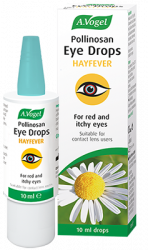An introduction to hayfever and dizziness
Dizziness is not one of the more common symptoms of hayfever but it can occur when we experience sinus congestion or when the Eustachian tubes in the ears become blocked. The Eustachian tube connects the middle ear to the back of the nose and is responsible for regulating air pressure on either side of the ear drums.
When the Eustachian tubes become blocked, pressure and fluid can build in the ear, resulting in difficulty hearing and feelings of light-headedness.
Although this can be very uncomfortable, the dizziness normally passes when the Eustachian tubes become unblocked. However if you still feel light-headed after your other hayfever symptoms have passed, it is important that you go and seek medical attention.
The causes of dizziness in hayfever
If you have ever travelled aboard an airplane at a young age, you can probably remember your parents telling you to pop your ears as the plane took off or being given hard boiled sweeties to suck on. This is because children in particular can be vulnerable when they experience a rapid change in air pressure as their Eustachian tubes have not properly developed.
When you encounter pollen, the immune system triggers the release of the chemical histamine, which can result in inflammation at the back of the nose.
As a result the Eustachian tube becomes blocked, meaning it cannot regulate air pressure on either side of the eardrums. When this happens, you can experience dizziness and feel out of balance as your sense of equilibrium has been compromised.
The symptoms of dizziness in hayfever
Dizziness can be defined as a sensation of lighted-headedness, normally accompanied by a feeling that you are about to faint. It can be associated with many different illnesses but dizziness can occur in hayfever as a result of the middle ear becoming blocked.
As with most symptoms in hayfever, this is caused by our immune systems perceiving pollen as an invading threat and releasing an excessive amount of the chemical histamine. This chemical then acts as an inflammatory agent, swelling and irritating the sensitive lining of the ears and nose. When this happens, it is likely that any feelings of dizziness would be accompanied by other symptoms such as:
- Earache
- Congestion
- Difficulty hearing
- Headaches
- Blocked ears
If you are experiencing these symptoms alongside one another then any feelings of dizziness should pass once the middle ear becomes unblocked, allowing the mucus to drain and rebalancing the pressure in your ears.
Home remedies
Blocked ears, or blocked Eustachian tubes are common complaints that can be associated with a multitude of different health conditions. As a result, there are many tried and tested home remedies that exist to try and ease any discomfort and congestion found in the middle ear.
- Inhaling steam: Inhaling steam is one of the more popular methods used to thin and loosen mucus in the nasal and ear passages. Some people opt to lower their heads over a steaming bowl of water, but another more indulgent option might be to have a long bath or a hot shower
- Popping your ears: Another home remedy that has already been mentioned is to try and pop your ears. This can equalise pressure in your middle ear, however it must be done gently otherwise you can risk damaging or perforating your ear drum. An alternative to this might be to suck on boiled sweets as this can produce a similar result
- Spicy foods: If you are a fan of hot spicy foods, such as curries or horseradish, then it might pay to indulge your cravings as these types of food products can act as a decongestant, softening the mucus lining your ears. There are a number of healthy ways to incorporate spicy foods into your diets, such as trying out our recipes for Vegan Squash and Coconut Curry or our delicious Vegetarian Thai Green Curry
- Drink plenty of water: It is also important to stay hydrated if you are feeling dizzy. You should be drinking between 8-10 glasses of plain water a day; this will help to thin mucus in the lining of the ears as well as avoid any further symptoms of light-headedness that can accompany dehydration.
Herbal remedies
If your Eustachian tubes are being blocked because of hayfever, then it is worthwhile treat your seasonal allergies first. The well-known Swiss naturopath Alfred Vogel conceived a way of treating hayfever symptoms using a variety of different herbs, resulting in the creation of Pollinosan Hayfever Relief Tablets. Pollinosan tablets are a licensed medicinal product that can be used to treat a broad variety of common hayfever symptoms.
Plantago is another herbal solution believed to specifically target blocked ears, reducing the mucous membranes of the upper respiratory tract.
Conventional medicines
The most common medication used to alleviate hayfever symptoms are medicines containing anti-histamine.
Anti-histamines can be bought over the counter and are taken to tackle the release of excessive amounts of histamine in our immune systems. Some anti-histamine drugs contain chemicals that can cause drowsiness, so it is always advisable to avoid driving or operating heavy machinery.
If your symptoms are more persistent then your doctor might prescribe you a course of steroids for short-term relief. It is important to make sure that you do not continue taking any steroid treatments beyond ten days; otherwise you might be at risk from developing a range of unpleasant symptoms.




 Looking for relief of red and itchy eyes due to hayfever?
Looking for relief of red and itchy eyes due to hayfever?

